|
|
|
Psychological Healing
in the Catholic Mystic Tradition

Recommended Reading

For the
time will come when people will not tolerate sound
doctrine
but, following their own desires and
insatiable curiosity,
will accumulate teachers and will stop listening to
the truth
and will be diverted to myths. |
—2 Timothy 4:3 |
Fear |
Healing |
Therapy |
Spiritual Counsels |
Books |
About CSF
Introduction |
Practical Readings |
Readings of the Faith |
Additional Readings: Saints |
Additional Readings: General |
Additional Readings: My
own books
 FTER
the decline and fall of the Roman
Empire, when illiteracy became the norm of the general population, the average
Christian depended on icons and preaching for guidance in the faith. And
for centuries thereafter, even with the Renaissance in the West, lay Catholics
depended on educated clerics for religious instruction. FTER
the decline and fall of the Roman
Empire, when illiteracy became the norm of the general population, the average
Christian depended on icons and preaching for guidance in the faith. And
for centuries thereafter, even with the Renaissance in the West, lay Catholics
depended on educated clerics for religious instruction.
Now that’s all well and
good, except for the fact that when the clerics get it wrong, everybody suffers.
And that is precisely the case in the modern world. You could attend
Mass every day of the week for years and still not learn
much—if anything—about the Catholic faith. Most priests
today feed their flocks little of any holy substance but offer them, day after day,
the spiritual equivalent of potato chips and soda pop—or, as it is in many
parishes, coffee and donuts.
Furthermore, religious education
has, more often than not, fallen into the hands of those who dissent from
the true faith. Religious educators, seduced by the
social world around them, like the ancient Hebrews
embracing the idols and abominations of the heathen lands around them, now
place their “faith” in the diversity
of secular values derived from humanistic
psychology. And all the while the bishops, like shepherds terrified of
the wolves, run from the cross with their tails between their
legs.
 |
Do you know how
people often snicker when they hear the words “military intelligence,”
thinking it to be an oxymoron? Well, true Catholics feel the same way when
they hear a reference to “Catholic education.” And, even more sadly,
especially in the US, the same is true of the words, “holy
bishop.” |
 |
So I will say it plainly, and
yet with tears and sadness: if you think that being a good Christian means
no more than going to church on Sunday, praying the Rosary, and then enjoying
yourself the rest of the time, and if you’re not willing to spend serious
time in prayer and reading spiritual texts by giving
up social media, TV, movies, video games, and constant texting on your mobile device,
then you’re in serious trouble.
 |
“What’s wrong with these
things?”
“They corrupt your mind and lead
it astray by opening it to demonic influence—and
you won’t even be aware that it’s occurring.”
“That’s ridiculous. I use Facebook
and Twitter and watch TV and movies all the time, and I don’t see anything
wrong with them!”
“That’s what I just told
you.” |
 |
So, do you get it? We’re all in
danger of having our minds snatched by
evil, and most of us don’t even realize
it—even those who have already been snatched.
 |
But you, remain
faithful to what you have learned and believed, because you know from whom
you learned it, and that from infancy you have known the sacred scriptures,
which are capable of giving you wisdom for salvation through faith in Christ
Jesus. . . . For the time will come when people will not tolerate sound
doctrine but, following their own desires and
insatiable curiosity, will accumulate teachers and will stop listening to
the truth and will be diverted to myths. But you, be self-possessed in all
circumstances; put up with hardship; perform the work of an evangelist; fulfill
your ministry.
|
 |
|
— 2 Timothy 3:14–15;
4:3–5 |
|
Practical
Readings

 |
Read these books
to learn the essential facts of the Christian faith.
 |
 |
Catechism
of the Catholic Church: Revised in Accordance With the Official Latin
Text Promulgated by Pope John Paul II, 2nd edition (Liberia Editrice
Vaticana, 2000).
Paperback ISBN: 0-87973-976-2 |
 |
Reverence
for the Holy Eucharist: Reverent and Proper Conduct In a Catholic Church
by Raymond Lloyd Richmond, Ph.D.
Paperback ISBN: 979-8307139196 |
|
|
Read this book
to make the entire Bible easy to comprehend.
 |
 |
Bishop Frederick Justus Knecht,
D.D. A Practical Commentary on Holy Scripture
TAN Books and
Publishers
Paperback ISBN: 0-89555-757-6

If you need help interpreting the Bible, in simple,
understandable language, this is it. It’s far superior to most
blind-leading-the-blind Bible study groups. |
|
|
Use this book
to help make prayer a foundation of your daily life.
 |
 |
Christian Prayer [the
one-volume edition of the Liturgy of the Hours]
Catholic Book Publishing
Corp.
ISBN: 0-89942-406-6

Use the four-volume edition if you are familiar with
it. |
|
|
—and use my own book
to learn how to pray the Liturgy of the Hours
 |
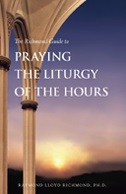 |
The Richmond Guide to
Praying the Liturgy of
the Hours
(3rd Edition) |
Readings of the Faith

 |
|
|
Read this book
to learn the simple beauty of Christian mystical reality.
 |
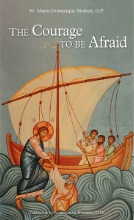 |
Fr. Marie-Dominique Molinié, O.P. The
Courage To Be Afraid, trans. Fr. Alexander Wisesman, SSPX (Saint Marys, KS:
Angelus Press).
Paperback ISBN: 978-1-949124-79-8

If you read this masterpiece and understand it, you will be
saddened to find that most Catholics who read this book will not understand the
poetic simplicity it exudes and teaches. As the author says, “We must live a life
where we lose our footing... this is the whole savor of the mystical life.” Yes, to
be afraid of our own self-assurance and to let God act. |
|
|
Read this book
to learn the core principles of genuine prayer from the heart.
 |
 |
Compiled by Igumen Chariton of Valmo. The
Art of Prayer: An Orthodox Anthology, trans. E. Kadloubovsky and E. M. Palmer (NY:
Faber and Faber).
Paperback ISBN-13: 978-0-571-19165-9

The book draws heavily on the writing of Theophan the Recluse, a
19th century Russian Orthodox bishop and spiritual director. In my opinion, no other
writer—Eastern or Western, Orthodox or Catholic—equals Bishop Theophan’s
spiritual and psychological clarity, and his ability to never miss the point about
prayer. |
|
|
Read this book
to learn the facts about evil and the demonic.
 |
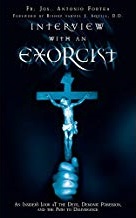 |
Fr. Jose Antonio Fortea. Interview With
An Exorcist (West Chester, PA: Ascension Press).
Paperback ISBN-13: 978-1-932645-96-5

This book provides clear and unpretentious answers to questions
about angels and demons, the reality of evil, demonic activity, temptation and sin,
demonic oppression and possession, and the path to deliverance from evil
influence. This is the best book I have read on the subject. |
|
|
Read this book
to learn the basic simplicity of applying Christian ideals in daily
life.
 |
 |
Thomas à Kempis. The
Imitation of Christ, trans. William Creasy (Notre Dame, IN: Ave Maria
Press, 1989).
Paperback ISBN: 0-87793-411-8

There are many translations of this timeless classic, and,
in my opinion, this is the best. |
|
|
Read this book
to understand and conform to the will of God.
 |
 |
Jean Baptiste Saint-Jure and
Blessed Claude de la Colombière. Trustful Surrender to Divine
Providence / The Secret of Peace and Happiness.
TAN Books and
Publishers
Paperback ISBN: 0-89555-216-7

Extracts from the writings of two influential religious
writers and spiritual directors from the 17th century. |
Additional Readings:
Saints

 |
Read this book
to learn how to put into practice a genuine devotion to the Blessed
Virgin.
 |
 |
St. Louis Marie de Montfort.
True Devotion to the Blessed Virgin (Bay Shore, NY: Montfort Publications,
1980).
Hardcover ISBN: 0-910984-49-2

Contains the Consecration To Jesus through
Mary. |
|
|
Read this book
to learn about the mystic process of “dying to the self” through
holy love.
 |
 |
St. John of the Cross. “The
Ascent of Mount Carmel” and “The Dark Night.” In
The Collected Works
of St. John of the Cross, trans. K. Kavanaugh and O. Rodriguez
ICS
Publications
Hardcover ISBN: 0-935216-15-4 |
|
|
Read this book
to learn from a practical, down-to-earth woman how the mystical effects of
divine love transformed her life.
 |
 |
St. Teresa of Avila. “The
Way of Perfection.” In The Collected
Works of St. Teresa of Avila, Volume Two, trans. K. Kavanaugh and O.
Rodriguez
ICS
Publications
Paperback ISBN: 0-9600876-6-4 |
|
|
Read this book
to learn how a life of devout Christian love reflects Christ’s own
suffering, sacrifice, and obedience.
 |
 |
St. Margaret Mary Alacoque. The
Autobiography of Saint Margaret Mary
TAN Books and
Publishers
Paperback ISBN: 0-89555-295-7

Intimate insights from the saint to whom Our Lord gave
the Sacred Heart revelations. |
|
|
Read this book
to learn the details about Purgatory and Hell.
 |
 |
St. Catherine & Don Cattaneo
Marabotto. The Spiritual Doctrine of Saint Catherine of Genoa
TAN Books and
Publishers
Paperback ISBN: 0-89555-355-X

This great lay mystic “wrote the book” about
Purgatory. |
|
|
Read this book
to learn how divine mercy becomes real in everyday life.
 |
 |
St. Maria Faustina Kowalska.
Diary
Association of Marian
Helpers
Paperback ISBN: 0-944203-04-3

The “Apostle of The Divine
Mercy” records Jesus’ message of mercy in a
diary. |
Additional Readings:
General

 |
Read these books
and be enthralled as the meticulous details of Biblical events allow salvation
history to come alive in its full human and divine reality.
 |
 |
Emmerich, Anne Catherine. The
Life of Jesus Christ and Biblical Revelations
TAN Books and
Publishers
Paperback ISBN:
(Vol. 1) 0-89555-787-8
(Vol. 2) 0-89555-787-6
(Vol. 3) 0-89555-787-4
(Vol. 4) 0-89555-790-8

One of the greatest treasures of Catholic mystical
writing shows “how the Roman Catholic Church faithfully follows the
teachings and administers the Sacraments of Jesus Christ
Himself.” |
|
|
|
|
Read this book
to learn the historical details about the mysteries recalled by the
Rosary.
 |
 |
Johnson, Kevin Orlin. Rosary:
Mysteries, Meditations, and the Telling of the Beads (Dallas: Pangæus
Press, 1996).
Paperback ISBN: 0-9653660-1-4

A comprehensive reference for the history and meaning
of the Rosary. |
|
|
Read this book
to learn the tell-tale signs of genuine mystic phenomena.
 |
 |
Johnson, Kevin Orlin.
Apparitions: Mystic Phenomena and What They Mean (Dallas: Pangæus
Press, 1998).
Paperback ISBN: 0-9653660-0-6

The only comprehensive reference book that puts
supernatural events clearly in their Biblical context. |
Additional Readings:
My own books

 |
 |
 |
Anger
and Forgiveness (4th Edition)
Most
of us carry more anger in our hearts than we are capable of admitting even
to ourselves. As a result, we often feel stuck in lives of unfulfilled potential,
unending resentments, and physical illness. In this book, Dr. Richmond explains
the deep psychological implications of anger and forgiveness and shows how
to turn the emotional wounds of daily life into psychological
growth.
Ordering Information |
|
|
|
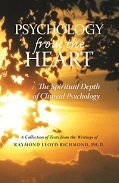 |
 |
Psychology
from the Heart
The Spiritual Depth of Clinical
Psychology
Psychology has too often been preoccupied with the pursuit of happiness, and it has
missed the point about helping individuals understand life and find a personally
meaningful—and practical—sense of direction. Psychology itself
cannot offer any meaning to life, but it can help individuals disentangle
themselves from the snare of illusory social identifications that keep us
trapped in spiritual blindness and pull us backwards into
self-destruction.
Ordering Information |
|
|
|
 |
 |
Healing
(2nd Edition)
Psychological Healing
in the Catholic Mystic Tradition
There is nothing wrong with psychological defenses. In fact, they help to protect us
from emotional injury. But if you cling to the defense mechanisms that were created in
your childhood and carry them on into adulthood—as most everyone does unconsciously—your
quest for spiritual healing will be thwarted by overwhelming resentments and conflicts.
So now, and in every moment until you die, you will have a profound choice between
your enslavement to old defenses and the beauty of God.
Ordering Information |
|
|
|
 |
 |
Disasters
and Trauma 3E
The Struggle for
Psychological and Spiritual Growth
An event is traumatic because it disrupts your previously secure sense of self. Consider
that wild animals live with a constant, sharp awareness of perpetual danger, yet most
people live with a naive—and deceptive—sense of safety and security to the
point of denying their basic vulnerability and fragmented sense of self. So
when something disastrous happens, the psychological damage from the shattering
of your illusions about life and identity may be more problematic than any physical
damage.
Ordering Information |
|
|
|
 |
 |
Falling
Families, Fallen Children 2E
Parents see themselves
as devout Catholics, but what do their children see? Do they see a mother and a father
both living in contemplative love for God with a faithful emotional awareness of divine
presence and engaged in an all-out battle with the evil of the world? More often than
not children don’t see living faith. They don’t see any protection from evil. They
don’t see genuine, fruitful devotion. They don’t see genuine love for God. Instead,
they see external acts of devotion as insincere because they see all the other things
their parents do that contradict the true faith. Thus parents lose credibility—and when
parents lose credibility, children can become cynical and angry and turn to the social
world around them for identity and acceptance. They become children who have more concern
for social acceptance than for loving God. They are fallen children. Let’s bring them
back.
Ordering Information |
|
|
|
 |
 |
Though Demons
Gloat
They Shall Not Prevail
Though we are attacked by liberal activists from without and by apostasy from within,
the true Church—that is, the body of those who remain faithful to Church tradition—weeps,
and she prays, because she knows the fate of those who oppose God. Our enemies might fear
love, and they can push love away, but they can’t kill it. And so the battle against them
cannot be fought with politics; it requires a profound personal struggle against the
immorality of popular culture. The battle must be fought in the service of God with
pure and chaste lifestyles lived from the depths of our hearts in every moment.
Ordering Information |
|
|
|
 |
 |
Beyond
the Veil of Lust
Overcoming Obsessions with
Pornography and Masturbation
This book is about a veil—the veil of illusion that draws you into lust and temptation,
day after day. Armed with the truth herein, you will be able to pray for the strength
and courage to persevere through your trials into confident trust in divine protection.
You will learn to seek out the true humility of confidence, not the false
satisfaction of competing with others to make yourself feel strong and powerful.
You will learn to admit your wretchedness and to seek the grace to love, and to
pray for, everyone—even your enemies—despite the mistreatment you received as a
child and continue to receive, even now, as an adult. Thus you will learn to seek
the desire for holy love that will grow in you and overshadow every other desire.
Do this and you will not only understand love, you will be living it.
Ordering Information |
|
|
|
 |
 |
Boundaries
Protecting Yourself From
Emotional Harm
Always treat others with respect and dignity, even if you do not agree with them. But if
they treat you with a lack of respect and dignity, then protect yourself with healthy
boundaries. This book teaches you about healthy psychological boundaries.
Ordering Information |
|
|
|
 |
 |
Weight
Reduction
Through Faith and
Prayer
This is not one more “diet book” among a multitude of diet books that tell you what to
eat. This book teaches you how to use prayer to strengthen your free will to nurture the
attitudes and behaviors that will result in weight reduction.
Ordering Information
|
|
|
|
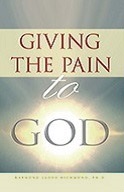 |
 |
Giving the
Pain to God
The Path to Emotional
Healing and Forgiveness
In contrast to all the human illusion—and folly—of anger and revenge, you have another
option. That is, when you are hurt, you don’t have to fight back, trying to hurt others
as they have hurt you. If you trust in God’s perfect justice to protect you, then you
can accept all injury quietly, peacefully, and without grumbling or protest.
Ordering Information |
|
|
|
 |
 |
The Veil of
Purity
The Supernatural Purpose of
the Chapel Veil
Sadly, most women who refuse to wear a chapel veil don’t understand its real purpose, and
many women who do wear a veil do so for the wrong reasons. So, should women wear a chapel
veil out of duty? No. Should they wear a veil only at the Latin Mass? No. Is the veil a sign
of oppression of women? No; in fact, it’s just the opposite. If women dress modestly at all
times they will be a holy influence on men and society, and if they cover their heads when
praying they will protect themselves spiritually from those who feed upon irreverence and
impurity. Women have a crucial mission—a mission of supernatural purity—in liberating
themselves, the Church, and society in general from the oppression of irreverence and impurity
that, day by day, are increasingly attacking us all.
Ordering Information |
|
|
|
 |
 |
Desire and
Distraction
A Catholic Perspective
on Behavioral Change and Its Subversion
The psychological relationship between “want” and “desire” explains why changing problematic
habits or addictions can be especially difficult. As much as someone might want to start
exercising or stop using drugs or alcohol, for example, there can be a desire to maintain
an old, dysfunctional behavior for the sake of the familiarity, comfort, hate, or self-punishment
the behavior produces. Consequently, forcing behavioral change with sheer discipline will likely
fail unless the underlying desire to fail is overcome with a different desire. So now, and in
every moment until you die, you will have a choice between failure and success. That decision
has to come from you. You will go where you desire.
Ordering Information |
|
|
|
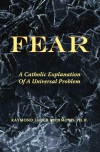 |
 |
Fear
A Catholic Explanation of
a Universal Problem
Fear keeps alcoholics drinking, addicts addicted, and wretched sinners stuck in sin like
quicksand. In fearing the darkness of the human psyche you never get to feel the true joy
of real light. Because, after all, the light of truth illuminates the dark and shows the
darkness for what it is. So there you are, in full irony: in your fear of the dark, you
end up fearing love itself. Still, despite the fear, there is hope. The shards of broken
love can be repaired.
Ordering Information |
|
|
|
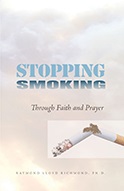 |
 |
Stopping Smoking
Through Faith and Prayer
If you are addicted to any substance, you are declaring with your behavior that you “love” the
addiction more than you love God, and so you will fail to love God as Christ commanded us: You
shall love the Lord, your God, with all your heart, with all your soul, and with all your mind
(Matthew 22:37). But, if only you train yourself through faith and prayer to desire holiness more
than you desire an addiction, any addiction can be overcome. Accordingly, to stop smoking it will
be necessary not only to overcome the addiction to nicotine, but also it will be necessary to
overcome the habit of always reaching for tobacco (either as a behavioral reward or as a means
to relieve anxiety) instead of reaching out to God in prayer. If you follow the guidance within
this booklet, you will be able to say, “When I trust in You, Lord, You are my best and oldest
friend. I do not need to soothe myself with tobacco. With Your grace, I am not a slave to
impulses and addiction.”
Ordering Information |
|
|
|
 |
 |
The Spiritual Dimension of
Borderline Personality Disorder
and Healing the Rage
Psychoanalytic writers have tended
to focus on identity—or, to be more precise, the lack of a
stable identity—as the core of Borderline Personality Disorder (BPD). But identity and
personality are social illusions because they fluctuate over time and situations. The real
core of BPD is rage. Rage is not an “identity”; it is simply a raw and primitive form of anger
as a response to the fear of emotional or physical abandonment. BPD therefore is not some
shameful illness that a person is “born with.” BPD is really just a collection of psychological
defenses—all related in some way to rage—that children acquire in childhood as a way to protect
themselves from the emotional trauma they experience in their families. Unlike books that
advocate the common mode of treatment, this book explains the spiritual dimension of healing
the rage.
Ordering Information |
|
|
|
 |
 |
Catholic compassion
When They Tell You That the Moral Teachings of the Catholic Church Are Wrong
It would be humorous, if the consequences
weren’t so tragic, that contemporary society tries desperately to convince us that Catholic
compassion is wrong because it lacks compassion.
All of us—but especially children and young adults—are constantly being tempted by liberal
rationalism to doubt the moral teachings of the Catholic Church. Today, we are induced to
look with desire at immoral behaviors that separate us from a holy life, and, when we fall
for the trap, we justify those immoral behaviors with a pernicious yet seemingly innocent
notion, “How can there be anything wrong with something that seems so nice?”
This book can help you understand how friends, teachers, professors, the entertainment
industry—and even priests—can lead you away from God under the deceptive guise of “being
compassionate.”
Still, we have an obligation—an obligation that ensues from having chosen to follow Christ
in the way of the cross—to not hate those who hate chastity, to not fear those who fear suffering,
to not reject those who reject holiness itself. And even if they close their ears to our words,
we have a compassionate obligation to pray that they might someday, before they die, make the
choice to listen to, rather than reject, the Holy Spirit. We have an obligation to live the
genuine compassion that much of contemporary society around us wants to reject.
Ordering Information |
|
|
TRUE
DISCIPLES . . . will point out the narrow way to God in pure truth according
to the holy Gospel, and not according to the maxims of the world. Their hearts
will not be troubled, nor will they show favour to anyone; they will not
spare or heed or fear any man, however powerful he may be. They will have
the two-edged sword of the Word of God in their mouths and the blood-stained
standard of the Cross on their shoulders. They will carry the crucifix in
their right hand and the rosary in their left, and the holy names of Jesus
and Mary on their heart. . . . By the will of God, Mary is to prepare them
to extend His rule over the impious and unbelievers. |
—Saint Louis Marie de Montfort
True Devotion to the Blessed Virgin, no. 59 |
|






































